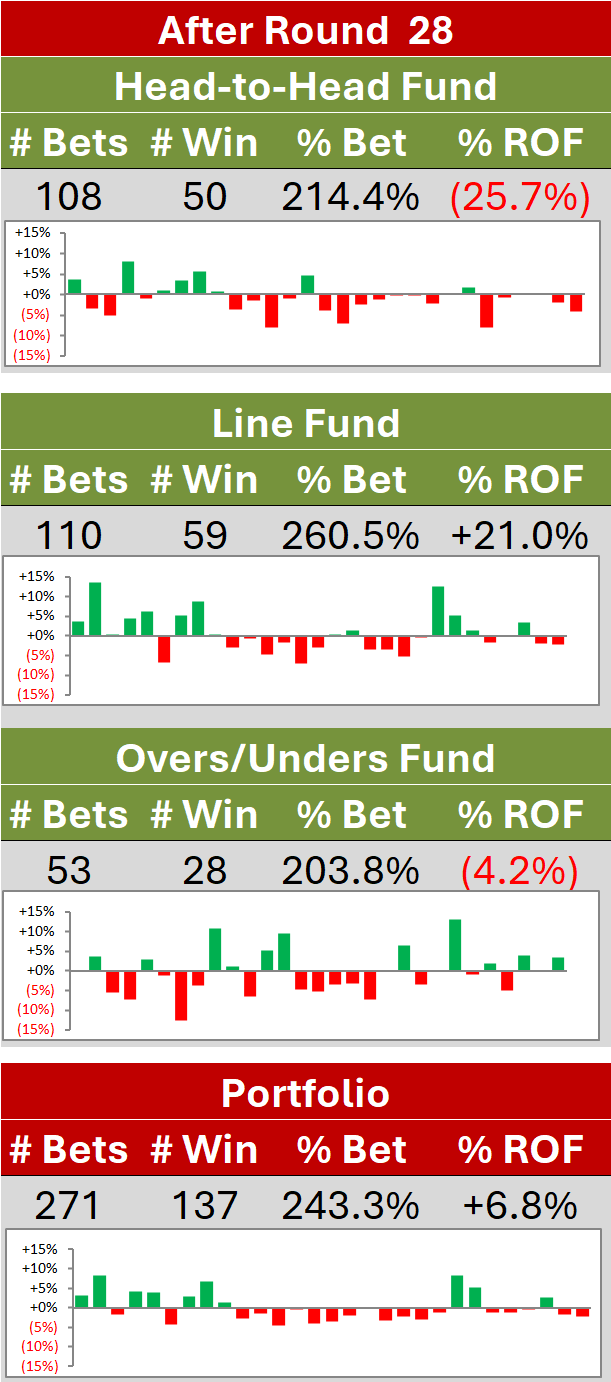Leads and Lead Changes in AFL
/In the previous blog here on Statistical Analysis I referred to this paper and applied its drift-free Random Walk model to the "safety" of leads recent AFL history, finding that, to some extent, it fitted empirical data well.
Read More
Are AFL Games Like Random Walks?
/I came across an interesting journal article this week, published in March of 2015 on arXiv.org and entitled "Safe Leads and Lead Changes in Competitive Team Sports".
Read MoreA Few More Simulations: Losing With More Scoring Shots and Playing a Draw
/The last few blogs here on the Statistical Analyses part of the website have used a model of team scoring that I fitted late last year to explore features of game scores and outcomes that we might expect to observe if that model is a reasonable approximation of reality.
Read MoreMapping Expected Margins to Probabililties
/I'm a sucker for a colourful chart, and today's is based on simulations using an earlier model of Home and Away team scoring, constrained by bookmaker-based empirical realities.
Read MoreFitting Team Winning Percentages: Alternatives to Pythagorean Expectation
/I've addressed the topic of fitting a team's winning rate as a function of its scoring behaviour before on MoS, in discussions about Win Production Functions generally and in posts about Pythagorean Expectation specifically.
Read MoreScoring Shot Conversion Rates: How Predictable Are They?
/In my earlier posts on statistically modelling team scoring (see here and here) I treated Scoring Shot conversion as a phenomenon best represented by the Beta Binomial distribution and proceeded to empirically estimate the parameters for two such distributions, one to model the Home team conversion process and the other to model Away team conversion. The realised conversion rates for the Home team and for the Away team in any particular game were assumed to be random, independent draws from these two fixed distributions.
Read MoreScoring In Bursts: Evidence For In-Game Momentum?
/The notion of momentum gets flung about in sports commentary as if it's some fundamental force, like gravity, that apparently acts at both long and short distances. Teams have - or don't have - momentum for periods as short as a few minutes, for perhaps half a quarter, going into the half-time break, entering the Finals, and sometimes even as they enter a new season, though I think when we start talking about momentum at the macro scale we wander perilously close to confusing it with another fundamental sporting force: form. It's a topic I've addressed, in its various forms, numerous times on MoS.
Read MoreAre Some Games Harder to Predict Than Others?
/If you've ever had to enter tips for an office competition where the the sole objective was to predict the winner of each game, you'll intuitively recognise that the winners of some games are inherently harder to predict than others.
Read MoreSuperMargin Implications? Yes, They Are Atrocious.
/In a recent blog I developed an empirical model of AFL scoring in which I assumed that the Scoring Shots generated by Home and Away teams could be modelled by a bivariate Negative Binomial and that the conversion of these shots into Goals could be modelled by Beta Binomials.
Read MoreWhy AFL Handicap-Adjusted Margins Are Normal : Part II
/In the previous blog on this topic I posited that the Scoring Shot production of a team could be modelled as a Poisson random variable with some predetermined mean, and that the conversion of these Scoring Shots into Goals could be modelled as a BetaBinomial with fixed conversion probability and theta (a spread parameter).
Read MoreWhy AFL Handicap-Adjusted Game Margins Are Normal
/This week, thanks to Amazon, who replaced my unreadable Kindle copy of David W Miller's Fitting Frequency Distributions: Philosophy and Practice with a dead-tree version that could easily be used as a weapon such is its heft (and assuming you had the strength to wield it), I've been reminded of the importance of motivating my distributional choices with a plausible narrative. It's not good enough, he contends, to find that, say, a Gamma Distribution fits your data set really well, you should be able to explain why it's an appropriate choice from first principles.
Read MoreCreating Margin Predictions From Head-to-Head Prices: A Summary
/As I was writing up the recent post about the application of the Pythagorean Expectation approach to AFL I realised that it provided yet another method for generating a margin prediction from a probability prediction.
Read MorePythagorean Expectation for the VFL/AFL and the NRL
/I've been refamiliarising myself with the idea of Pythagorean Expectation and its application to the historical home-and-away results for the VFL/AFL
Read MoreTeam Scoring Shots and Conversion Rates
/In response to my earlier post on the explained and unexplained portions of game margins, Friend of MatterOfStats, Michael, e-mailed me to suggest that variability in teams' points-scoring per scoring shot - or, equivalently, teams' conversion rates - might usefully be explored as a source of unexplained variability.
Read MoreExplaining Variability in Game Margins
/Some seasons are notable for the large number of blowout victories they force us to endure - a few recent seasons come immediately to mind - while others are more memorable because of their highly competitive nature. To what extent, I've often wondered, could we attribute a season full of sizable victory margins to the fact that strong teams were more often facing weak teams, making the magnitude of the defeats predictable if still lamentable, versus instead attributing them to on-the-day or random events that were genuinely unforeseeable pre-game?
Read More
